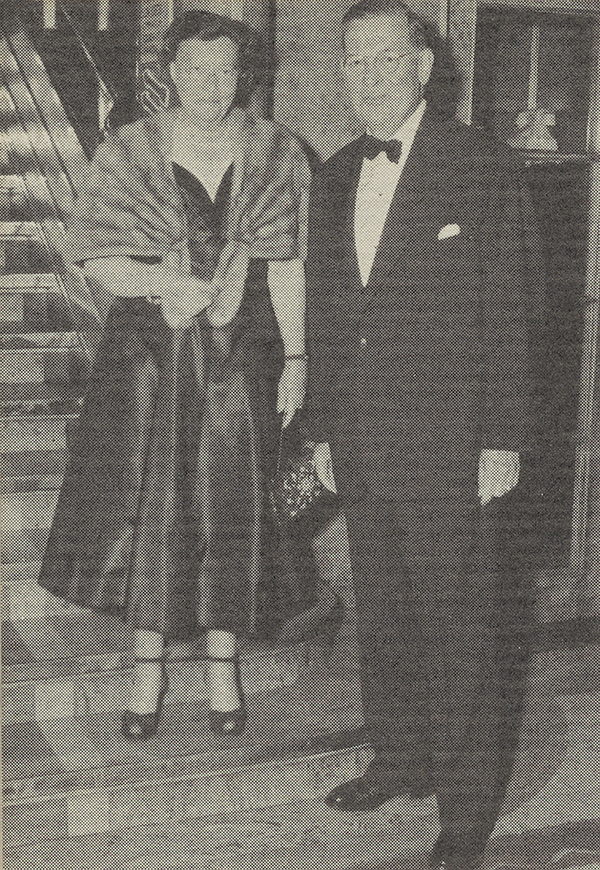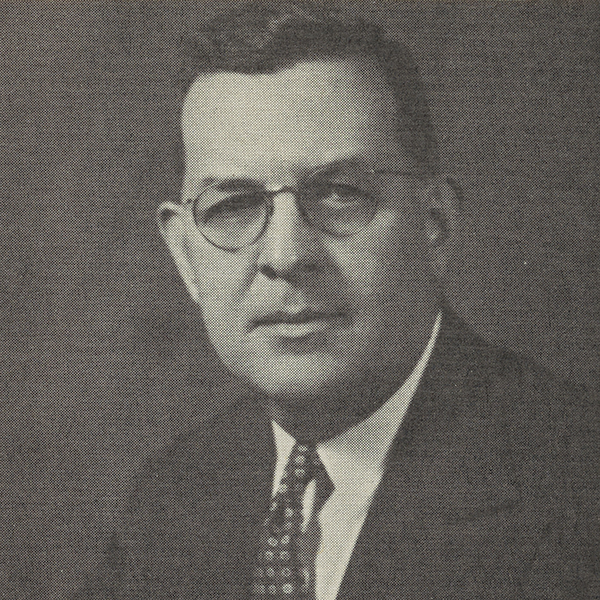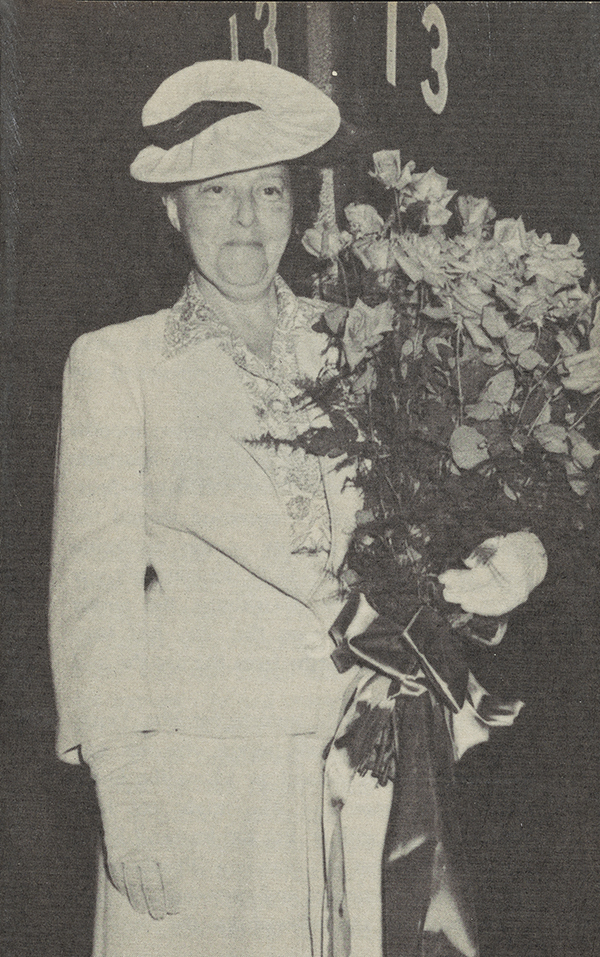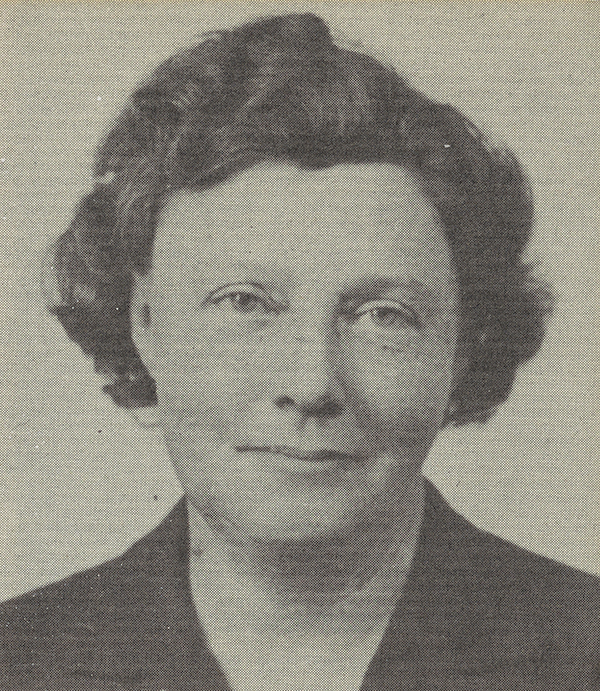Queens couple create a legacy of helping children at The Trust.
Reba Q. Lerch (1888-1969)
In 1969, Frank H. Lerch’s will established the Reba Q. Lerch Fund in memory of his wife, to be administered by The New York Community Trust for charitable purposes.
Though a summer shower dampened the crowd at the shipyard and sprinkled droplets on the armful of roses she clutched, Reba Q. Lerch ignored the light rain. Proudly, she swung the bottle of Champagne as she christened the new Standard Oil tanker.
The date was July 18, 1942, seven months after Pearl Harbor. The place was Sparrows Point, Maryland, where the Bethlehem-Sparrows Point Shipyard, operating around the clock at maximum capacity, was building ships vital to the country’s war effort. The SS Esso Harrisburg, the tanker that slid down the ways that day, had been built in just four months from the day the keel was laid.
It was a rare public moment for Reba Lerch, who was a very private person. She felt sure the honor should have gone to others, who might not have been so uneasy with it. But her husband, Frank, was president of a Standard Oil subsidiary, so, partly out of patriotism and partly out of loyalty to him, she could not refuse.
Born in Oxford, New Jersey, on March 20, 1888, Reba was the daughter of Anna and Irving Quick. When Reba was 3, her family moved to Scranton, Pennsylvania, where her father opened a hardware store and where her younger sister, Florence, was born.
Reba attended grade school and Central High School in Scranton. She was a serious, quick-minded student, and her parents wanted her to continue her education. She went on to Bloomsburg State Normal School, a two-year college that prepared her to teach mathematics. During the summer after her graduation in 1909, Reba took a trip to Easton, Pennsylvania, to visit her grandmother. While she was there, she was introduced to a young chemist, Frank H. Lerch Jr. He had spent all his life in Easton, where he lived with three unmarried aunts who had raised him after his parents died. He had recently graduated with a Bachelor of Science degree from Lafayette College in the same town and gone to work for the Empire Steel and Iron Co. in nearby Catasauqua. Frank and Reba soon discovered he was only a week younger than she, for his birth date was March 27, 1888. And they found they had enough other things in common to establish the beginning of a friendship.

Frank made frequent trips to Scranton, where Reba was teaching second grade, and, as several years passed, the friendship ripened into romance. Then, in 1914, Frank moved to New York, where he took a job with the T.A. Gillespie Co., a general contracting firm. Now he and Reba saw each other less frequently, but the prolonged absences drew them closer. After a year of lonely separation, they made plans to marry. Their wedding on Oct. 7, 1915, when both were 27, brought an end to Reba’s teaching career and the beginning of a long and companionable marriage.
For several years, the Lerches lived in Flushing, then a pleasant neighborhood in the New York City borough of Queens, and Frank made the long trip daily to his job in Manhattan. At the end of World War I, Frank left the contracting business for a government job, and for two years he worked on the settlement of war contract claims with the U.S. Army Ordnance Department in New York. That assignment finished, he joined Ford, Bacon and Davis Inc., a New York engineering firm.
Although Frank’s educational background was in chemistry, but his greatest abilities proved to be in engineering and management. He was a quiet, unassuming man. In 1927, he accepted a job as resident manager at the Interstate Natural Gas Co. of Louisiana, a subsidiary of Standard Oil of New Jersey. Frank and Reba left their home in Flushing and moved to Monroe, in the northern part of Louisiana. They stayed there for seven years. Although the Great Depression weighed heavily on the country, Frank’s industry was vital and his job a crucial one. As a result, he and Reba were spared the hardships suffered by so many during those difficult years.
Then, in 1934, Frank was made coordinating head of all the natural gas interests of Standard Oil of New Jersey, an advancement that brought the Lerches back to New York. Frank and Reba returned to Queens, settling this time in Jackson Heights. They moved into an apartment in one of the gracious new buildings that were beginning to bring a taste of city amenities to the quiet suburban community.
 A year after Reba Lerch helped launch the SS Esso Harrisburg for her husband’s company, Frank made another important step forward. He directed the organization and development of the Consolidated Natural Gas System, a merger of Standard Oil of New Jersey’s natural gas interests, which then became a separate entity. And he was named the first president of Consolidated Natural Gas Co., the parent company of the Consolidated Natural Gas System. In this position, he successfully guided the system through its first years of independent operation and then, after the end of World War II, through a period of extraordinary growth and expansion. During those years, natural gas production increased prodigiously. It grew from 3.9 trillion cubic feet in 1945 to 6.8 trillion cubic feet in 1950—nearly double—and continued to climb. Frank Lerch was one of those responsible for creating a network of natural gas pipelines, some of them 2,000 miles long, to keep pace with increasing production and demand. In 1953, two years before his mandatory retirement at age 65, Frank Lerch was named chairman of the board. But when retirement time came, a dynamic leader like Frank found it hard to call an end to his career, and he served the company for two more years as a consultant.
A year after Reba Lerch helped launch the SS Esso Harrisburg for her husband’s company, Frank made another important step forward. He directed the organization and development of the Consolidated Natural Gas System, a merger of Standard Oil of New Jersey’s natural gas interests, which then became a separate entity. And he was named the first president of Consolidated Natural Gas Co., the parent company of the Consolidated Natural Gas System. In this position, he successfully guided the system through its first years of independent operation and then, after the end of World War II, through a period of extraordinary growth and expansion. During those years, natural gas production increased prodigiously. It grew from 3.9 trillion cubic feet in 1945 to 6.8 trillion cubic feet in 1950—nearly double—and continued to climb. Frank Lerch was one of those responsible for creating a network of natural gas pipelines, some of them 2,000 miles long, to keep pace with increasing production and demand. In 1953, two years before his mandatory retirement at age 65, Frank Lerch was named chairman of the board. But when retirement time came, a dynamic leader like Frank found it hard to call an end to his career, and he served the company for two more years as a consultant.
Through all those years of hard work, steady advancement, and ultimate success, Reba was at her husband’s side. She was an astute businesswoman with a good head for figures. She handled her own investments, and Frank often relied on her for help with his business problems. She sometimes spoke of going back to teaching, or even into business, but her health prevented it.

Even as a child, Reba had never been robust and had suffered from allergies. She lost two babies soon after their births, a disappointment for both husband and wife that took a physical toll on Reba. Although she was always somewhat frail and the onslaught of arthritis brought a new and continual discomfort as she grew older, she constantly pushed herself. Her husband was her primary concern; her church was a major interest. Those who worked with her noted that she always tried to do more than her strength would allow. The Lerches were members of the Community Methodist Church of Jackson Heights, where Reba was deeply committed to the work of the Women’s Circle, sewing for hospitals and knitting for babies in need. During World War II, Reba took an active role in the Red Cross and was vice president of the Jackson Heights chapter.
Throughout her life, Reba remained a dedicated student. She loved to read and study, and occasionally tried her hand at writing. Flowers were one of her great joys, and although an apartment village seemed an unlikely place, she led a large group of neighbors who gardened in the commonly owned plots between the buildings. She soon found herself president of the garden club. The Lerches‘ apartment bloomed abundantly with flowers in season, and she often remembered her friends with fresh bouquets.
Frank’s positions as a management executive gave the Lerches many opportunities to travel. Despite her pain, Reba usually accompanied her husband on business trips. To spare Reba as much discomfort as possible, their travels were accomplished in luxury—by private car and driver. When the direction was somewhere west, they often managed to visit Hawaii. For a while they also made regular trips to Florida. Then they discovered they liked Europe better. But the land of greatest fascination, they learned at last, was Africa, and they returned there more than once.
Frank’s favorite hobby was photography. He indulged this love on their frequent travels, and one room of their apartment was given over to his extensive collection of colored slides—mostly of animals and flowers captured by his camera in exotic places. Golf was a second interest, and in late summer they made an annual trip to Manchester, Vermont. In the quaintness of the lovely New England town, they stayed at the venerable Equinox House. Frank enjoyed getting out on the golf course, and Reba found relief from her allergies.
They both loved children. As they traveled, Reba always found time to shop for small gifts. Then, back at home, she was ready with “surprise packages” for the young visitors who came to their apartment.
Although they could have afforded a more elegant home, the Lerches preferred to stay in their simple Jackson Heights apartment. There, they lived comfortably for more than 30 years, entertaining the many friends and neighbors who warmly returned the affectionate hospitality of the serious Frank and the quiet, responsive Reba. They were as unostentatious in their kindness and service to others as they were in their simple way of life. Though they educated more than one deserving child, they never spoke of their good works. Whatever their friends knew of such quiet helpfulness, they learned indirectly—never from the Lerches themselves.
During their later years, the health of both Frank and Reba failed to such an extent they could no longer travel. On April 2, 1969, after being in and out of the hospital a number of times, Reba Quick Lerch died at age 81. Frank was brokenhearted without his companion of nearly 54 years. Reba was constantly on his mind. He spent bittersweet hours recalling the many things they had done together, the places they had visited, the interests they had shared. One of their deepest mutual concerns, born of the pain of their own losses, was the welfare of children. He loved the very young as much as she did, and in his loneliness and grief he came upon one more thing they could do together.
Frank Lerch wanted to honor the memory of his wife and to carry on the work he knew she cared about. He was a successful businessman who carefully nurtured his life savings. In his will, he created the Reba Q. Lerch Fund to be administered by The New York Community Trust to support children and youth with physical disabilities.
That summer, he returned to Vermont alone. He was there only a few days. On August 7, 1969, only four months after the death of his wife, Frank H. Lerch died. He, too, was 81.
